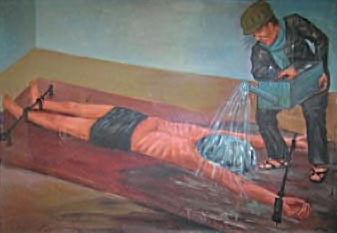 A few months ago fellow NYU inhabitant Joshua Tucker of The Monkey Cage asked what, if any, social science research had been done on the effectiveness of torture in obtaining valuable intelligence? Josh’s primary question was an ethical one, that being if a researcher had a personal objection to the use of torture, but through an empirical analysis of data found that it in fact did extract valuable data, should the researcher attempt to get it published despite his or her personal objection? This touched off a very interesting discussion among Monkey readers, and I recommend it to all.
A few months ago fellow NYU inhabitant Joshua Tucker of The Monkey Cage asked what, if any, social science research had been done on the effectiveness of torture in obtaining valuable intelligence? Josh’s primary question was an ethical one, that being if a researcher had a personal objection to the use of torture, but through an empirical analysis of data found that it in fact did extract valuable data, should the researcher attempt to get it published despite his or her personal objection? This touched off a very interesting discussion among Monkey readers, and I recommend it to all.
Today, Josh revisits the topic, but this time with a bit of relevant research in hand. In “Interrogational Torture: Or How Good Guys Get Bad Information with Ugly Methods,” John Schiemann presents a theoretical model of an interrogation.
Briefly, the model has two players, the detainee and the state, where the state is uncertain about the value of the detainee’s knowledge and the detainee is uncertain as to the state’s willingness to use torture. The state moves first, by either asking leading questions (uninformative signal) or objective questioning. The detainee must then decide to send a valuable message, or not. Finally, the state evaluates this message to ascertain the detainees type, and from this decides whether to use torture to extract additional information (for a full description of the game see the paper).
In approaching this research, Schiemann struggled with the exact ethical dilemma hypothesized by Josh in his first post, and after deciding to research the the topic he concluded:
…even in a worst case scenario in which torture is shown to be effective under some limited circumstances, we would want to know that. What is the alternative? The alternative is to do nothing and help preserve a status quo in which torture is unrestrained. As difficult as it would be to swallow a result showing some limited effectiveness of torture, I’d rather live with that than what the U.S. has been doing – and perhaps is continuing to do.
There are two interesting points of discussion that fall from this discussion. First, do we believe the model presented above is an accurate or useful interpretation of the decision process of a state to use torture? One weakness to note is the presumed equality of uncertainty between the players. The state is rarely completely uncertain as to the value of a detainee’s knowledge. Presumably some amount of intelligence collection went into the decision to capture and interrogate a detainee, therefore, the state can (and does) have the ability to rank the value of detainees. Likewise, unless a detainee is the first of a given conflict, the game is clearly repeated; consequently, all subsequent detainees will be able to update their beliefs about a state’s type. It may be more valuable, and easier to model, to make this a repeated game of one-way uncertainty, where a state is known to use torture, but the type of detainee is unknown by adding noise to the intelligence collected on a detainee prior to capture.
The second point of interest are Schiemann’s thoughts on how social scientists should approach researching ethically sensitive topics (for his full remarks see the Monkey post). My opinion is that all finding should be disclosed; first because it is a fundamental principle of scientific endeavor, but more to the point, it can expose false assumptions and promote more accurate models to be built and explored. For example, the model above is an excellent first step toward building a theory of how a state decides to use torture. As we can clearly see, however, it is in no way the definitive model on the topic. If the results from this model show that torture is effective that does not mean it should be used. On the contrary, it means that under the assumptions of this particular model, in some cases, it is shown to be effective. Improving the model, and generating new results, may alter the conclusion completely (or not). This iterative process is the only way to contribute valuable knowledge to a discipline.
I am interested in other’s thoughts, both in terms of the model, but also how to approach research on these kinds of topics. Particularly from practitioners (not necessarily of torture) within the defense community. How is this model getting at the dynamics of interrogation, and where does it fail? How might it be improved? Also, as consumers of social science research, how do you think the community should handle these ethical concerns?
Photo: Wikimedia
Drew Conway, CEO and founder of Alluvium, is a leading expert in the application of computational methods to social and behavioral problems at large-scale. Drew has been writing and speaking about the role of data — and the discipline of data science — in industry, government, and academia for several years.
Drew has advised and consulted companies across many industries; ranging from fledgling start-ups to Fortune 100 companies, as well as academic institutions and government agencies at all levels. Drew started his career in counter-terrorism as a computational social scientist in the U.S. intelligence community.


0 Comments